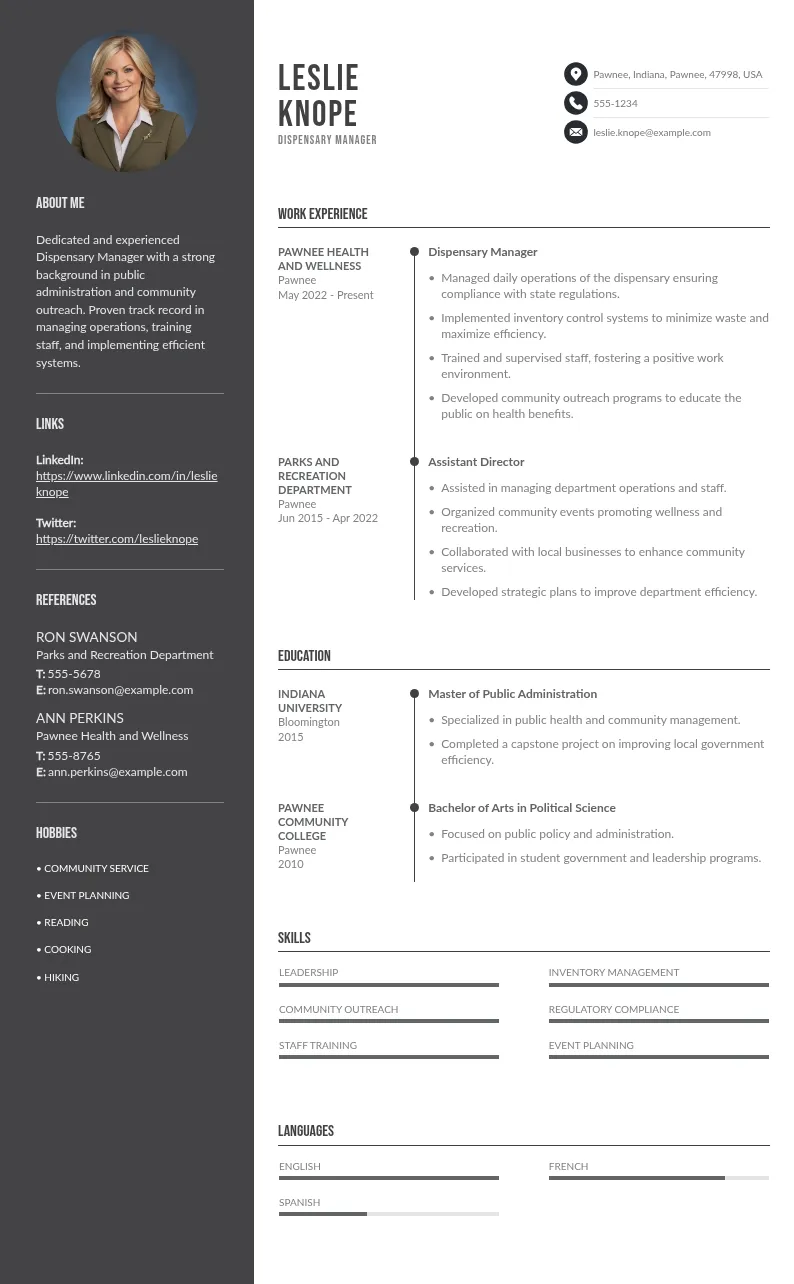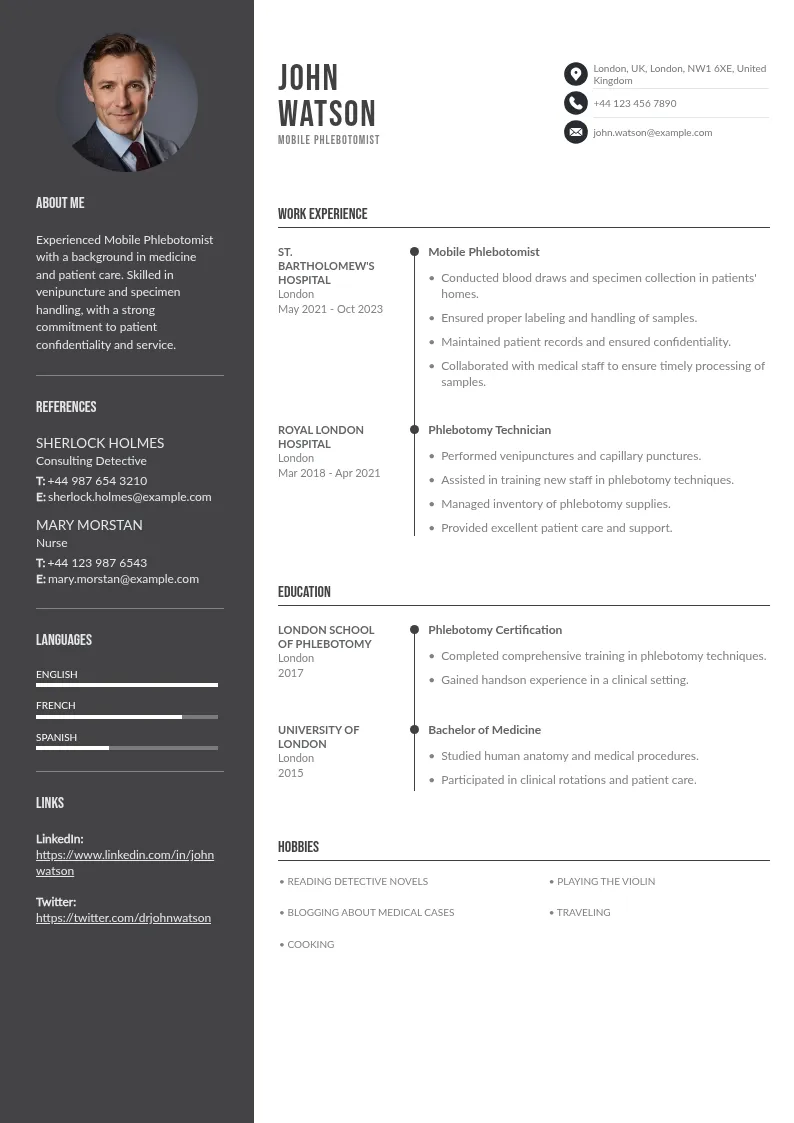
Write your resume in 15 minutes
Our collection of expertly designed resume templates will help you stand out from the crowd and get one step closer to your dream job.


To answer all these, we have written this guide to discuss everything you need to know about writing an associate’s degree on your resume.
This will also help you write your Bachelor’s degree or Master’s degree on your resume because we take complete examples of education sections to explain the best way to write this section.
A well-written education section can cut through the noise in the recruiting process. It says you know your stuff.
The overall appearance of a resume is just as important as the content. We have created a set of modern resume templates to make your resume stand out from the rest. Try them for FREE.
What is an Associate Degree in the First Place?

An associate’s degree is an undergraduate degree awarded at the completion of a two-year degree program. Most graduates are in between their secondary education and bachelor’s degree level.
The primary focus of associate degrees is to provide the necessary technical skills required for the candidates to get into their relevant fields of employment faster or to start further studies. These skill-oriented programs enable the candidates an early entry to the job market or to start their own businesses.
An associate’s degree would be considered a legit and valid education qualification to apply for any job in the market.
Common Associate Degree Abbreviations
Here is a guide to associate degree abbreviation. However, when using abbreviations, you need to be careful. If you abbreviate your Master’s degree or the Bachelor’s degree, a hiring manager would easily figure it out – but your associate degree would be something they would be less familiar with.
- AA (Associate in Arts)
- AAT (Associate of Arts in Teaching)
- AS (Associate in Science)
- AAS (Associate in Applied Science)
- AAB (Associate in Applied Business)
- ABA (Associate in Business Administration)
Should You List Your Associate Degree on Your Resume?
This is a question most candidates get. However, there’s no direct “Yes” or “No” answer for this.
It all depends on your profile, experience, and the relevancy of your associate degree.
Let me explain,
If you are a candidate with a Bachelor’s degree and a Master’s also with years of experience applying for a managerial position in a reputed company, you don’t have to consume your resume space to list the associate degree you earned 10 years ago unless it's highly relevant to the position you’re applying for.
For a candidate with limited work experience and academic background, an associate degree would be a significant achievement. It's a legit degree like any other degree and they could use it on the resume. In such instances, even if your associate degree is not directly relevant to the job you’re applying for, you may list it.
Where Should You List Your Associate’s Degree?
List your associate degree in the education section on your resume and in the cover letter if it is appropriate.
Again, this depends on the candidate's profile.
If your only significant qualification to apply for the job at the moment is your associate degree, you could even write it in the professional summary.

How to Write Associate Degree on Resume? (with Examples)
When you list your associate degree on your resume, depending on where you write it, the details you write should be different.
Education Section
If you have multiple degrees to list, write your education section in reverse chronological order – list the most recent academic achievements first.
This is where you list the most information about your associate degree.
When writing your education section, you should use a consistent format. Here’s what we suggest:
Education
Name of the degree
University/ institution
Status/ year of completion
Special achievements
List 2 to 3 learning outcomes
You should write all this information under your associate degree only if this information adds value to your profile.
You can also consider writing a full description for your associate degree if that is the only academic qualification that aligns with the job description even though you have other qualifications.
Here are a couple of examples:
Example 01:
Education
Bachelor’s degree in electrical engineering technology, 2012-2016
University of Wisconsin
GPA: 3.6/4F
- Solid work
- Fluid dynamics
- Mechanics of machines
Associate degree in motor mechanics, 2010-2012
Institute of Motor Mechanics, CA
GPA: 3.8/4
- Motor vehicle repair & assemble
- Vehicle inspection
- Automotive system design
Job applying: Engineering trainee at Ford assembly plant
As the associate degree is relevant and adds value to the candidate profile for the above position, a descriptive education section would serve the purpose. In fact, the candidate is applying for an entry-level position whereas they may not possess much work experience.
Example 02:
Education
Master’s degree in Human Resource Management
Sheffield Hallam University, UK
2019-2021
Bachelor’s degree in Business administration,
University of Montana, Missoula
2016-2019
Associate degree in Arts (2015-2016)
If this candidate is applying for a managerial position, the associate degree in arts would be less relevant. In such instances, the candidate could just mention the associate degree in one line saving two lines of precious resume space which could be used to write more important and relevant information.
Professional Summary/ Objective Summary
If your associate degree is your only academic qualification or a critical academic requirement for the position you’re applying for, you may include that in your professional summary or the objective summary.
The professional summary is a 2 to 3-sentence statement highlighting your key skills and greatest achievement relevant to the job you’re applying for.
The objective summary is pretty much the same as the professional summary, except that it describes an entry-level candidate's career objectives and skills.
Your resume summary should not contain anything that isn't directly related to the job you're applying for. If your associate degree could potentially hook the hiring manager to read the entire resume, you may include it here.
A passionate retail manager with an associate degree in sales seeks to join KD Mart to advance my career in FMCG. In my previous position at Walmart as a retail store supervisor, I devised sales strategies to generate off-season sales growth of 13%.
In this example, the candidate is expressing their strength in sales – the associate degree further helps to prove the point with the additional academic qualification.
Cover Letter
You could also list your associate degree in your cover letter.
This will be helpful if your associate degree is highly relevant to the job or if you wish to demonstrate to the hiring manager that you have some sort of academic background.
A cover letter is a tailored document that candidates use to demonstrate their interest and relevant skills on a single page – it’s a tailored document for each job.
Use the first paragraph of your cover letter to answer how you’ll fit the job and what relevant skills you could bring to the table.
In the second paragraph, you may list your skills, experience, and academic qualifications. This is where you should write your associate degree. However, your associate degree should be highly relevant to the job to state in your cover letter.
If you need further information about how to write a perfect cover letter, refer to these cover letter examples:
- Production assistant cover letter
- Software engineer cover letter
- Administrative assistant cover letter
Also, check out our cover letter templates to create a perfect cover letter.
Tips to Improve Your Resume Education Section
- Having an associate degree in your education section is far better than having no higher educational background at all – hiring managers like to consider candidates with higher education experience.
- Relevance is the most important parameter when you consider whether to include your associate degree or not.
- The education section will be the least priority for most hiring managers – always give priority and space to your experience.
- If an associate degree is your only higher education qualification, include relevant coursework, learning outcomes, and projects.

Summary: List an Associate Degree on a Resume Correctly
- Whether to include your associate degree in your resume depends on your personal profile.
- Your associate degree can be listed in your education section, professional summary, and cover letter.
- As with any other academic degree program, an associate degree has value and legitimacy.
FAQs
Should I include all my degrees on my resume?
You should. It does not matter whether a degree or academic program is relevant to your job or not, every degree or academic program can add value to your career. However, you have limited space on your resume. So make sure you add what is relevant to that position first and give less priority to the rest.
Write your main degrees first and use one or two lines to state the rest of your academic qualifications.
Is an associate degree more important than a high school diploma?
Yes, an associate degree is a legit degree very close to a bachelor’s degree. The only difference is a bachelor’s degree takes about 3 to 4 years to complete while an associate degree only takes about 2 years.
Create your resume with the best templates



![How to List Your Associate Degree on a Resume [with Examples and Pro Tips]](https://cdn.prod.website-files.com/652e8c998f656fbf00cb7c99/65853fdc0da4f43edb5ef3a9_6532432acede3c4a7cabfe37_how-to-write-associate-degree-on-resume.webp)













